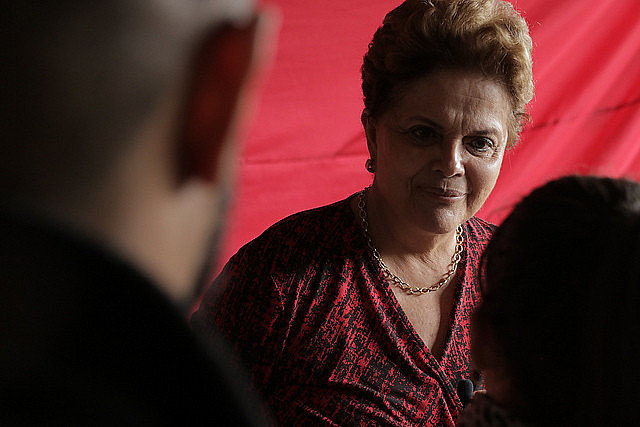Since the election of Jair Bolsonaro in Brazil, a new scenario has been unfolding for people’s struggles in Brazil. As the far-right rises in the country, progressive forces need to reorganize and find common values to stop the setbacks. That is what ex-president Dilma Rousseff envisions for the political scenario emerging in 2019.
The first female president in Brazil’s history spoke with Brasil de Fato about how important it is to reconcile optimistic and pessimistic views to build an opposition that is capable of facing the far-right.
Read the interview below:
Brasil de Fato: We’ve recently witnessed a number of attempts to evict [MST occupations] and we understand this will continue [in the future]. What is your opinion on the importance of the struggle for land in this political context, and how can society mobilize to help stop these evictions?
Dilma Rousseff: I think the struggles for land and housing are the two major struggles in Brazil, because they are about the distribution of wealth. Distribution of income is about [the conditional cash transfer program] Bolsa Família and a number of things we have done, making sure, for example, to have above-inflation minimum wage rise. But the big step forward, what matters to the Brazilian people when it comes to distribution of wealth is, first, land and housing, retirement, and quality education.
Our [the Workers’ Party] administrations [2003-2016] were following that path toward income distribution. We started with [the affordable housing program] Minha Casa Minha Vida, the settlements, tackling the issue of distribution of wealth. And I believe it will, over this end of decade and the next decade, be a central issue in Brazil. We will not be a developed nation if we don’t have the ability to face that. And that comes with a number of other things, for example, tax reform. Taxation that increases income inequality, like ours, is not feasible. That’s where there is the issue of capital gains – which are untouchable in Brazil.
Another issue that will necessarily arise is the fact that there is brutal concentration of income and wealth in the hands of the financial sector in our country and the world. So I think this is a fundamental issue, because it’s also the basis of a bigger democratization of our society. Otherwise, we will be stuck in what we are. You move a little bit forward, they come and take away what you advanced. You see the Oxfam’s study on concentration of income: concentration of income increases, extreme poverty increases, you [the country] is back to the “hunger map.” It’s that vicious circle.
[Facing these problems] is crucial for any country to become – I’m not even saying a socialist country, but a nation that has responsibility towards its citizens.
What is your message of resistance for activists whose morale is low about the next [Jair Bolsonaro] administration?
Joy is a basic form of resistance. A great, valuable fighter has to feel certain, hope, and strength to fight. They also have to have the ability to analyze [the context], some kind of pessimism that comes with rationality. This combination is what I wish for the MST [Landless Workers’ Movement]. This ability to feel optimistic, from will, and pessimistic, from reason. These two [elements] together are what makes us resist.
We have to have the pessimism that comes from reason to overcome and assume what the possible scenarios are for the struggle. At the same time, [optimism] is what makes us resist and get this strength from inside us, this feeling, the pursuit of a better world, the pursuit of fraternity.
What this movement has is an awareness of fraternity. What binds us together – and that’s how it should be – is a relationship in which we are fraternal with each other. This is why we don’t want this extremely competitive, individualistic society. We want cooperation, the values that made us become people, because it was not fierce competition that made us become people. We become people when we start to cooperation. And this fraternity is what is in the movements.
I am especially concerned about the MST. It’s Brazil’s most organized social movement. It’s time for us to come together, protect each other, and face it, because we will have to resist. All of us, democrats, who stand up for the people of the country and for its sovereignty – we have to be together with the MST.
What are the perspectives for social organizations and movements to resist outside institutions in 2019?
I think this will be a fundamental moment to start to focus on struggles outside institutions again, organizing outside institutions. And this combination between institutions and struggle outside them is the key to our resistance. Women’s, workers’, landless workers’, unemployed workers’ struggles… It’s very important to organize unemployed workers because right now there is no perspective to make sense of their struggle.
When governments or struggles are not alternatives for part of the people who has nowhere to go, no one to resort to, or nothing to resort to, they then resort to easy solutions, theories like, for example, the Escola Sem Partido, criminalizing views on gender. All this creates an environment where the children of the far-right are born.
We have to be able to go back to the grassroots. We have to reinforce and amplify that work with those who were already there, and take those who were not there through this path. And combine both things. The institutional struggle is not enough. Mass organization is not enough. They’re crucial, but one is not enough when it’s isolated from the other.




